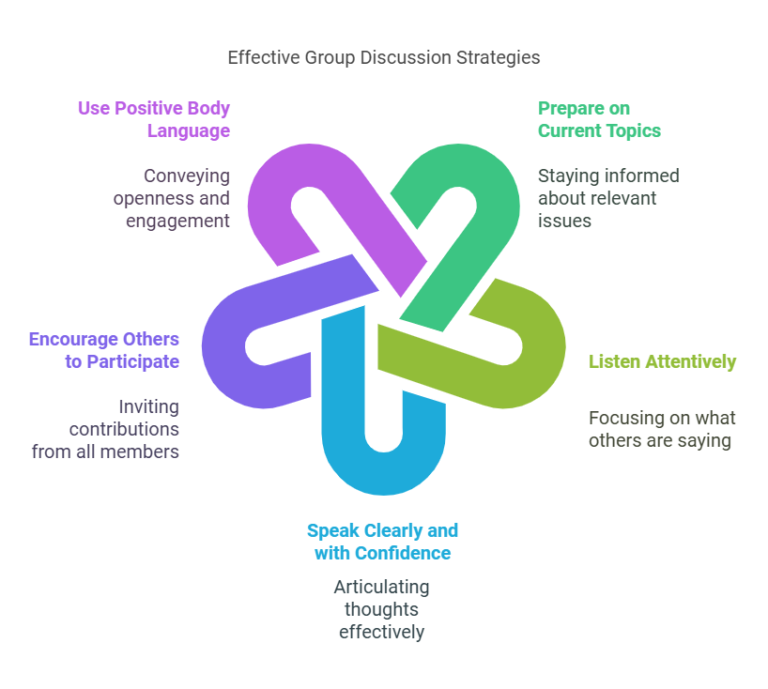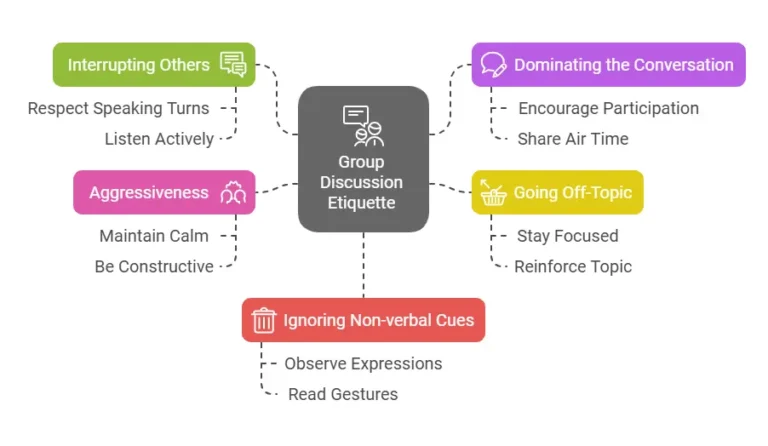Group Discussion
Group Discussion
Group discussions have become an essential part of selection processes in education, recruitment and competitive exams. They are a valuable tool for assessing a candidate’s communication skills, leadership potential and ability to work in a team. While interviews focus on individual performance, group discussions test how well candidates can function in a group, share ideas and navigate differing viewpoints.
Unlike one-on-one interviews, group discussions require candidates to engage in a collaborative conversation with several other participants. It is not about who speaks the most but rather who contributes meaningfully. Group discussions help assess how candidates present their ideas, listen well, and interact with others. They reflect real-world scenarios where teamwork and collaboration are crucial to success.
Definition and Purpose
A group discussion is a structured and focused conversation among a group of individuals on a specific topic. It typically involves 6 to 10 participants with a topic to discuss for a set period, usually 15-30 minutes. A group discussion aims to assess how candidates think, communicate and work within a group. It also evaluates problem solving skills, leadership abilities and the capacity to respect and incorporate diverse perspectives.
In group discussions, participants are expected to express their ideas clearly, support their viewpoints with logical reasoning and respond to the arguments of others respectfully and constructively. The aim is not to dominate the conversation but to contribute meaningfully to a collective discussion.
Group discussions can cover topics such as current events, social issues or abstract ideas. The evaluators are interested in your knowledge and how you present your ideas, listen to others and build on the conversation. It tests your ability to remain composed in a dynamic and sometimes competitive environment.
For example, in a recruitment process, a group discussion can give the employer insights into how a potential employee might behave in team settings, how they might handle conflicts and whether they can articulate their ideas clearly. It helps assess students’ critical thinking, creativity and communication skills in academic settings.
Techniques of Group Discussion

Excelling in group discussions requires more than just good speaking skills. It involves listening, thinking quickly and working with others. The following techniques will help you contribute effectively to any group discussion, whether for a job interview, an academic exam or a competitive process.
Stay Informed and Well-Prepared: Although you may not know the exact topic of the group discussion beforehand, staying informed about current events, global issues and common social debates will equip you with the knowledge to handle any topic. Read newspapers, follow the news and discuss important issues to stay prepared. This background information will help you make well-informed contributions and present strong arguments during the discussion.
Listen Actively and Respectfully: Active listening is crucial in group discussions. Before you speak, make sure you have understood what others are saying. Paying attention to others’ arguments allows you to build on their points or present counterarguments respectfully. Listening carefully also helps you avoid repetition, ensuring that your contributions add value to the conversation. Respect for others’ views is critical, even when you disagree.
Speak Clearly and Confidently: When it is your turn to speak, ensure your points are clear, concise and logically structured. Avoid talking too fast or too softly. Confidence is essential, but it should not come across as arrogance. Make your contributions in a calm, respectful tone, ensuring your voice is audible to everyone. If you hesitate or are unsure, take a moment to collect your thoughts before speaking.
Stay Relevant and On-topic: One common mistake in group discussions is straying off-topic. Make sure your points are always relevant to the subject of the debate. If the conversation veers off-course, tactfully bring it back by summarizing the key points and steering the group toward the topic. This shows that you are focused, organized and capable of guiding a discussion without dominating it.
Encourage Participation from Others: A good group discussion is collaborative, not competitive. While you should share your points, it is equally important to encourage silent members to contribute. You can do this by asking for their opinions or acknowledging their earlier contributions. This shows that you value teamwork and are not simply focused on winning the discussion. Leadership in group discussions often comes from ensuring everyone has a voice.
Organize Your Points Logically: When presenting your ideas, structure them clearly and logically. A well-organized argument is easier for others to follow and increases the impact of your point. Start with a brief introduction, explain your idea with supporting examples or evidence, and conclude with a strong summary. This method helps keep the discussion focused and shows you have thought through your points.
Be Polite and Diplomatic: In group discussions, it is common to encounter differing opinions. Disagreements are natural, but it is essential to handle them politely. Instead of dismissing someone else’s view outright, acknowledge their perspective and then explain why you disagree. For example, you could say, “I see your point, but I believe there’s another way to look at it,” before presenting your argument. This approach fosters a respectful and open discussion environment.
8. Use Non-verbal Communication Effectively: Non-verbal cues like eye contact, gestures, and posture play an important role in group discussions. Maintaining eye contact shows that you are engaged and open gestures (such as using your hands to emphasize points) can enhance your verbal communication. Avoid negative body language, like crossing your arms or looking disinterested, as this can give the impression that you are not fully involved in the discussion.
Dos in Group Discussion

Dos and Don’ts in Group Discussion
Certain behaviours can enhance or weaken your performance in a group discussion. Understanding the dos and don’ts will help you navigate the discussion effectively, ensuring that you make a positive impression on the evaluators and your peers.
Dos in Group Discussion
1. Do Prepare on Current Topics: Keep yourself updated on a wide range of topics, including current affairs, social issues and important global events. This will give you a strong foundation for contributing to any group discussion, as you will have the knowledge and facts to support your arguments. The better informed you are, the more confident you will feel when participating in discussions.
2. Do Listen Attentively: Listening is just as important as speaking in a group discussion. Pay close attention to what others say and ensure you understand their points before responding. Active listening helps you contribute more effectively and demonstrates respect for other participants’ views.
3. Do Speak Clearly and with Confidence: When it’s your turn to speak, make sure your points are clear, concise and well-organized. Speaking confidently doesn’t mean dominating the conversation but presenting your ideas with clarity and conviction. A calm, measured tone of voice will help ensure that your points are taken seriously by both evaluators and participants.
4. Do Encourage Others to Participate: A successful group discussion involves contributions from all participants. Encourage quieter members to speak by inviting them to share their thoughts. For example, saying, “I’d like to hear what you think about this,” can create a more inclusive atmosphere and demonstrate your ability to lead without overshadowing others.
5. Do Use Positive Body Language: Non-verbal communication can significantly impact how others perceive you. Positive body language, such as maintaining eye contact, nodding when others speak, and sitting upright, can show that you are engaged, attentive and respectful. Avoid negative signals like slouching, crossing your arms, or looking distracted.
Don'ts in Group Discussion

Don’ts in Group Discussion
- Don’t Interrupt Others: Interrupting others while they are speaking can come across as rude and disrespectful. Always wait for the speaker to finish before presenting your thoughts. If you need to speak, say politely, “May I add to that point?” This keeps the discussion respectful and allows for a smoother exchange of ideas.
- Don’t Dominate the Conversation: A group discussion is about collaboration, not competition. Even if you have strong opinions, avoid dominating the conversation. Give others a chance to speak, and don’t try to monopolize the discussion. Over-talking can create a negative impression, as you may appear more focused on winning than contributing constructively.
- Don’t Go Off-Topic: Staying on-topic is essential in group discussions. Avoid bringing in irrelevant points or personal anecdotes that don’t contribute to the main topic. If the discussion starts to wander, you can tactfully bring it back by saying, “Let’s get back to the main point,” and then steer the conversation accordingly.
- Don’t Be Aggressive or Confrontational: While asserting your views is essential, avoid being overly aggressive or confrontational. Disagreeing politely and presenting your argument logically will earn you more respect than being hostile. Aggression can make the discussion uncomfortable for others and reflect poorly on your ability to work in a team.
- Don’t Ignore Non-verbal Cues: Pay attention to your body language throughout the discussion. Negative cues like crossing your arms, looking bored, or avoiding eye contact can make you seem disinterested or disengaged. Positive non-verbal communication such as smiling, nodding and maintaining eye contact, shows you are actively involved in the conversation.
Multiple Choice Questions
1. What is the main purpose of a group discussion?
a) To assess individual communication skills
b) To evaluate one’s appearance
c) To assess teamwork and leadership skills
d) To identify the smartest participant
2. Which of the following is key in a group discussion?
a) Dominating the conversation
b) Active listening and staying on topic
c) Interrupting other participants
d) Speaking as little as possible
3. How can you encourage participation in a group discussion?
a) Asking others to remain silent
b) Inviting quieter members to share their views
c) Speaking louder to get attention
d) Taking control of the discussion
4. What should be avoided in a group discussion?
a) Making eye contact
b) Interrupting others
c) Summarising key points
d) Giving structured arguments
5. Why is it important to stay on topic in a group discussion?
a) To show respect to the moderator
b) To ensure the discussion remains focused
c) To impress others with irrelevant facts
d) To dominate the conversation
6. How can you show leadership in a group discussion?
a) Speaking more than others
b) Guiding the group back to the topic
c) Ignoring other participants’ ideas
d) Avoiding eye contact
7. What role does body language play in group discussions?
a) It is irrelevant
b) It distracts from the conversation
c) It shows confidence and engagement
d) It shows disinterest
8. Which of the following is positive body language in a group discussion?
a) Slouching
b) Making eye contact and nodding
c) Crossing arms
d) Fidgeting
9. What should you do if you disagree with another participant?
a) Interrupt them
b) Argue aggressively
c) Respectfully offer your view
d) Stay silent
10. Why should you prepare on general topics before a group discussion?
a) To appear smarter than others
b) To have background knowledge and contribute well
c) To dominate the discussion
d) To repeat what others say
Long Answer Type Questions
1. Explain the key techniques that can help you perform well in a group discussion.
2. Discuss the role of body language in group discussions and how it influences the outcome.
3. How can you encourage participation from others during a group discussion? Provide examples.
4. What are the key dos and don’ts in a group discussion? Explain with reasons.
5. How does technology impact communication and teamwork in group discussions?
6. Write a group discussion on the topic: "Impact of Social Media on Youth: Positive or Negative?" Include different perspectives, agreements, disagreements, and concluding statements.
Prepared by Prof. D.C. Nanaware
Edited by Prof. Dr. V.H. Waghmare


1 thought on “Group Discussion”